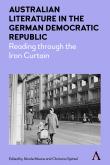 1938192139597461311.jpg
1938192139597461311.jpg
 Australian Literature in the German Democratic Republic : Reading through the Iron Curtain
anthology
Australian Literature in the German Democratic Republic : Reading through the Iron Curtain
anthology
 1938192139597461311.jpg
1938192139597461311.jpg
 Australian Literature in the German Democratic Republic : Reading through the Iron Curtain
anthology
Australian Literature in the German Democratic Republic : Reading through the Iron Curtain
anthology
'An account of fraught and complex cross-cultural literary exchange between two highly distinct - even uniquely opposed - reading contexts, Reading Through the Iron Curtain has resonance for all newly global reckonings of the cultural cold war. Working from the extraordinary records of the East German publishing and censorship regime, the authors materially track the production and reception of one country’s corpus as envisioned by another - the ninety Australian titles published in the GDR form an alternative canon, revealing a shadowy literary archive that rewrites Australia’s postwar cultural history from behind the iron curtain, and illuminate multiple ironies for the GDR as a ‘reading nation’. This book brings together leading German and Australian scholars in the fields of book history, German and Australian cultural history, Australian and postcolonial literatures, and postcolonial and cross-cultural theory, with emerging writers currently navigating between the two cultures.' (Publication summary)
Interview with German critic Bernhard Scheller in Windmühlenstraße, Leipzig.
' This appealing, aptly illustrated essay collection on the selective production and reception of Australian literature in the German Democratic Republic (GDR) brings together eleven essays written by Australian and German authors.' (Introduction)
'Emine Sevgi Özdamer’s protagonist in the tale Career of Char: Memories of Germany is ‘a witness of the solitude of the German high rise dwellers’. As she goes through her daily routine she ‘listens to the sounds of loneliness’1 and is able to inhabit only a rigidly fugitive state of mind.' (Introduction)
'This volume of essays is an engaging study of the reception of Australian literature in the GDR, the former East Germany. It explores the remarkable story of the publication and reception of Australian literature in the GDR by a state sponsored ‘publishing combine’ consisting of writers, editors, government officials, and censors. Some ninety-five titles by Australian authors dot the short history of the GDR from the early 1950s until that nation’s demise with German unification in 1990. Some titles, such as Marcus Clarke’s convict narrative For the Term of His Natural Lifehad a long and highly successful publishing history in the GDR, running into multiple reprints. Others such as Frank Hardy’s Power Without Glory (translated into German in 1952) paved the way for a steady stream of communist and social realist writers to travel to an ideologically congenial East Germany in the 1950s and 60s. Novels like these were refracted through a particular interpretive matrix in the GDR, remediated by publishers for pressing ideological purposes. As translators and cultural intermediaries, editors and translators in the GDR, often Anglophone academics, interpreted the history and culture of Australia as doubled: ‘geographically exotic’ yet ‘politically retrograde’, a utopic experiment whose depredations indexed the exploitative system of world-capitalism.' (Introduction)
'This volume of essays is an engaging study of the reception of Australian literature in the GDR, the former East Germany. It explores the remarkable story of the publication and reception of Australian literature in the GDR by a state sponsored ‘publishing combine’ consisting of writers, editors, government officials, and censors. Some ninety-five titles by Australian authors dot the short history of the GDR from the early 1950s until that nation’s demise with German unification in 1990. Some titles, such as Marcus Clarke’s convict narrative For the Term of His Natural Lifehad a long and highly successful publishing history in the GDR, running into multiple reprints. Others such as Frank Hardy’s Power Without Glory (translated into German in 1952) paved the way for a steady stream of communist and social realist writers to travel to an ideologically congenial East Germany in the 1950s and 60s. Novels like these were refracted through a particular interpretive matrix in the GDR, remediated by publishers for pressing ideological purposes. As translators and cultural intermediaries, editors and translators in the GDR, often Anglophone academics, interpreted the history and culture of Australia as doubled: ‘geographically exotic’ yet ‘politically retrograde’, a utopic experiment whose depredations indexed the exploitative system of world-capitalism.' (Introduction)
'Emine Sevgi Özdamer’s protagonist in the tale Career of Char: Memories of Germany is ‘a witness of the solitude of the German high rise dwellers’. As she goes through her daily routine she ‘listens to the sounds of loneliness’1 and is able to inhabit only a rigidly fugitive state of mind.' (Introduction)
' This appealing, aptly illustrated essay collection on the selective production and reception of Australian literature in the German Democratic Republic (GDR) brings together eleven essays written by Australian and German authors.' (Introduction)